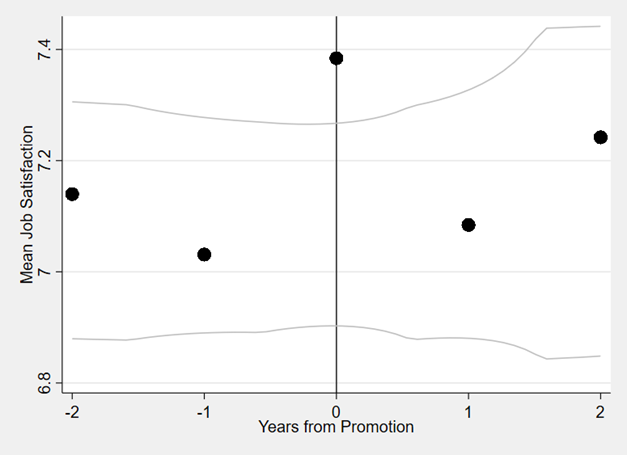Employees’ job satisfaction may increase after a promotion, but the effect will eventually disappear when they start comparing themselves to other leaders in the organisation — not to their former peers anymore. Hannah Dekker, Siegmar Otto, Vincent Dekker, David Richter, and Sarah Zabel write that a promotion’s positive effect usually does not last more than a year. To maintain a committed workforce in the long run, the authors suggest further human resource practices such as employee empowerment and participation in decision-making processes.
Nowadays, committed employees are one of the most relevant factors determining an organisation’s success. These employees show increased organisational citizenship behaviours such as helping others, reduced absenteeism, and a higher psychological well-being (e.g., Faragher et al., 2013; Judge et al., 2001; LePine et al., 2002). All these outcomes are beneficial to the organisation and the employee itself and are of high importance in times of crisis.
The ongoing coronavirus crisis led to many changes at work, with the increased occurrence of working from home and virtual meetings. The nature of supervision processes changed and confused the task of monitoring employees. Employees’ motivation to perform their tasks on their own, with less or no external control, is of even higher relevance. Job satisfaction plays a major role here, as it helps to foster commitment and increases job performance (Judge et al., 2001). Furthermore, digital transformation is changing work in many ways — often differently for different groups. Just a simple digital assistant can have unintended differential effects on women and men (Zabel, & Otto, 2021). But also, human resource decisions with much more levy are supported by algorithms or artificial intelligence specifically designed for this purpose. Even decisions about gratifications and probably promotions are based on artificial intelligence. In order to suggest the most gratifying experience, an algorithm has to know how much a promotion means to certain employees and how long its effect lasts.
Job satisfaction depends on several factors such as personality (Judge et al., 2002). The instruments that can be applied by human resource management (Kooij et al., 2010) play an important role. Among these instruments are gratifications on the individual level, such as job promotions, wage increases, bonuses, and performance-related pay. Scientific research has shown that such options are effective in the short-term (e.g. Francesconi, 2001; Pergamit & Veum, 1999; Schwarzwald et al., 1992) and can help to motivate employees. In these studies, gratifications were given to employees and job satisfaction was measured shortly after. But how long does the positive effect of a gratification last? How long can a job promotion satisfy an employee? We analysed the longevity of the effect of a job promotion by using longitudinal data across a period of 27 years with a representative sample and a wide age distribution. Some studies also demonstrated differential effects of gender, which we also studied.
Human life satisfaction tends to function according to the homeostatic principle (Fujita & Diener, 2005). This means that satisfaction will eventually return to a person’s base level, even though specific positive or negative events, for example a job promotion or a job loss, will increase or decrease the person’s satisfaction for a certain time. If an employee gets promoted, his or her job satisfaction will increase. The person has reached a new career stage, has become a leader, has more responsibilities and usually a higher status. However, after some time, the person compares his- or herself to other leaders and not to the former peers, the employees, anymore. Thus, due to the homeostatic principle, the other leaders become the new baseline for comparisons. Consequently, the job promotion loses its effectiveness, and the previously increased job satisfaction will again return to the person’s baseline level.
This is exactly what we found in our data: getting a job promotion had an immediate effect on job satisfaction. However, this positive effect declined shortly after the promotion. This is shown in Figure 1. The mean job satisfaction only lies above the grey confidence band in the year of the promotion, which means that the job satisfaction only differs significantly from the other values of job satisfaction in the year of the promotion. This demonstrates the short-term effect of getting promoted, however, there is no long-term effect. The effect of a job promotion does not last for longer than about one year.
Figure 1. Mean job satisfaction from two years before to two years after the year of promotion
Notes. Mean job satisfaction relative to year of promotion. The figure plots mean job satisfaction across the sample for the two years leading up to the promotion and the two years after.
One could counter that the increase in job satisfaction cannot be attributed to the promotion itself but to the higher wage that normally accompanies a job promotion. We checked for this alternative and controlled for the change in gross income as a form of gratification as well as the income level. The positive effect of the job promotion remained.
Even though a job promotion is one of the most powerful gratifications a person can receive (Kosteas, 2011), there are differential effects for men and women. If women are promoted, the positive effect of this promotion is smaller than for men. The main reason for this effect is the still conflicting roles of female gender and leadership (Eagly & Karau, 2002; Lup, 2018).
What can we learn from this research? Getting a job promotion increases an employee’s job satisfaction. However, human resource managers should not expect this positive effect to last for more than one year. Most probably, job satisfaction – like life satisfaction (Fujita & Diener, 2005) – works according to the homeostatic principle because it returns to its base level. To keep the employees’ job satisfaction on a high level, one might think of frequent gratifications. However, such gratifications might not be very effective as the employees start taking them for granted (Helson, 1964). Besides gratifications, managers should focus on further human resource practices to maintain a committed workforce in the long run, for example by enhancing the employees’ participation in decision-making processes (Cox et al., 2006) or employee empowerment.
Notably, the effect of a job promotion seems to be very impressive if translated into the level of wage increase that would be needed to produce the same positive effect on job satisfaction: An employee’s wage would have to increase by about 2.800 euros to achieve the same effect as a job promotion (when evaluated at the mean level of income in the study sample).
♣♣♣
Notes:
- This blog post expresses the views of its author(s), not the position of LSE Business Review or the London School of Economics.
- Featured image by Charanjeet Dhiman on Unsplash
- When you leave a comment, you’re agreeing to our Comment Policy





